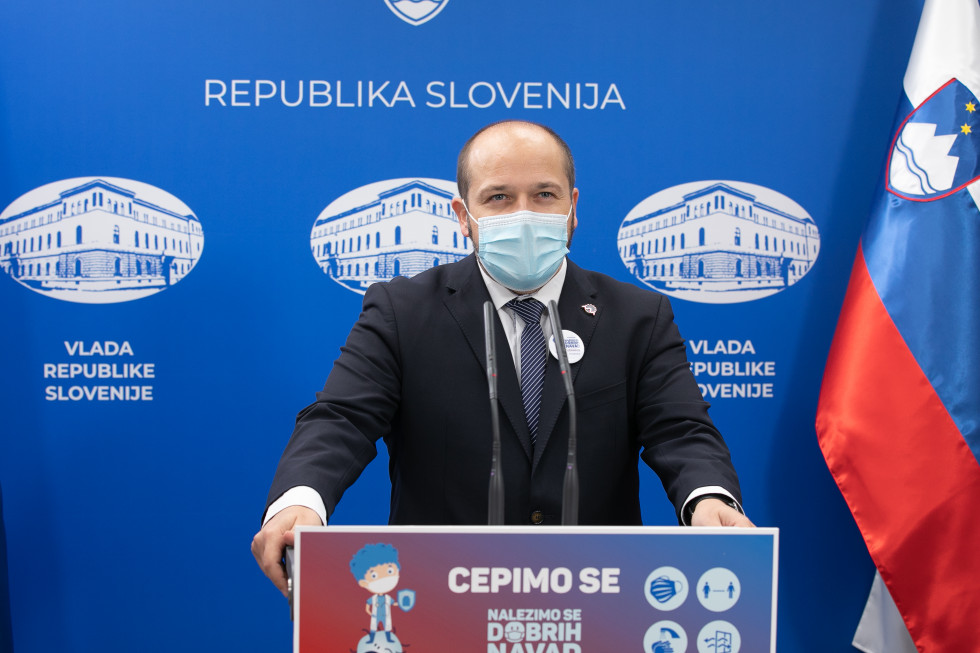By: UKOM
The Minister of Health, Janez Poklukar, and pediatrician Denis Baš took part in a press conference to provide a COVID-19 update.
Minister Poklukar presented the latest information on capacities in the healthcare sector and the mobilisation of staff. Today, 3763 people have been newly infected, or 419 more than last Tuesday. A total of 838 people require hospital care, 568 of whom need oxygen, and 236 more are being treated in intensive care units.
Minister Poklukar has explained that capacities are coordinated with hospitals on a daily basis. It has been agreed that as of today, all 288 planned capacities are being put in place. This brings us up to the maximum number of people we can treat to make the standard of treatment still minimally satisfactory. Preparations for what to do if we go beyond this figure are already under way. With intensive care bed occupancy above 288, we are declaring an extreme state of emergency in healthcare. Patients will be treated, but the standard will be drastically reduced. This will apply to both non-COVID-19 and COVID-19 patients.
We are already in a situation where we are barely saving lives on the one hand and treating acute and emergency medical conditions on the other, the Minister has stressed. One could say that we have a “health lockdown” in healthcare, because we have practically no other choice. All non-emergency medical interventions are cancelled or being cancelled.
These days, hospitals are prioritising their staffing capacity to treat COVID-19 patients and non-COVID-19 patients who are labelled urgent or very urgent. They can use other staff resources to provide non-urgent services when they first carry out the priorities. To facilitate the organisation, we have centralised the childbirth of women with COVID-19, psychiatric treatment and paediatric intensive care, said Minister Poklukar.
Currently, the biggest mobilisation and shifts of medical staff within the healthcare system in the history of independent Slovenia are taking place, Minister Poklukar pointed out, and called on everyone qualified to come forward, either through associations, organisations or hospital COVID-19 coordinators. The contact details of the 15 COVID-19 coordinators will be publicly announced on hospital websites. The most scarce are nurses who have any experience of working in intensive care units, as well as others who have ever worked in healthcare. Among doctors, there are critical shortages of anaesthetists, intensivists, internists, pulmonologists and neurologists. But, as Minister Poklukar says, any help from a healthcare professional is welcome.
Help is also provided by health professionals who are not employed at hospitals. In the first round, about 130 private healthcare providers and concessionaires responded to the emergency situation and for them the Medical Chamber of Slovenia developed a special application. We have also received a positive response from the education sector where 40 medical students and at least 260 secondary nursing school and healthcare faculty students are already deployed in the system. The military medical unit provided 20 healthcare professionals, while the Red Red Cross engaged 120 of their workers. On the basis of the Government’s decision to activate civil protection personnel capacities, 116 members of the civil protection service are on standby. Staff from all areas have responded decisively, including concessionaires and private entities who have come forward to help, showing great solidarity and understanding of the situation. Minister Poklukar thanked everyone.
He again called upon people to get vaccinated and to follow all preventive measures. We are still not consistent in meeting the recovered/vaccinated/tested rule and the Minister has therefore urged all employers to organise work from home as far as possible. If your rapid antigen self-test is positive, act responsibly, i.e. as if you are infected, and avoid walking around, stressed Minister Poklukar. In such cases stay at home and wait for the PCR test result.
Minister Poklukar concluded by lamenting the fact that the health care workers have shouldered all the anger and polarity of this society. Our state of mind has already brought us to the brink of the healthcare system collapse. Worse still, at this moment we are also facing a moral and ethical breakdown of our society. We should reflect deeply on this, said Minister Poklukar.
The pediatrician, Dr Denis Baš, also warned that the situation is extremely serious. The childern’s ward has recorded an increase in the number of children being hospitalised. As he points out, it is important that adults actually do their homework, which means getting vaccinated, meeting the recovered/vaccinated/tested rule and encouraging children to respect the required measures.
Baš said that children quickly get used to wearing surgical masks which protect them three times better than home-made masks and do not have consequences. Self-testing is easy, painless and also without consequences. In this way asymptomatic children can be isolated from other classmates and the spread of infections can be prevented, added Dr Baš.
He emphasises that pediatricians support a safe school environment and these measures are designed to do just that. He therefore urged everyone to set a positive example to their children. Research and practice have shown that when there are as many infections in society as it is the case now, children under 10 years significantly contribute to the transmission of the disease.
The Primary Pediatrics Section has produced a short video showing 7-year-olds how to do self-testing.

